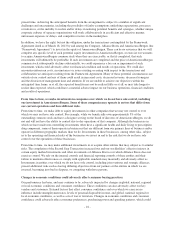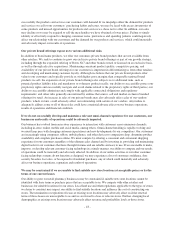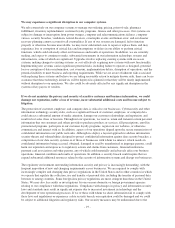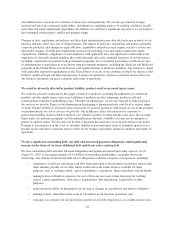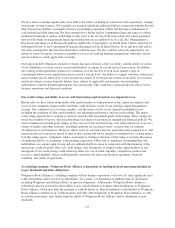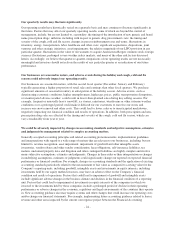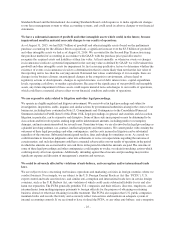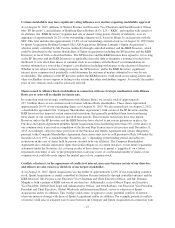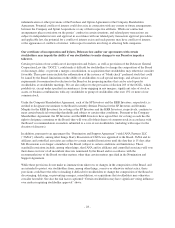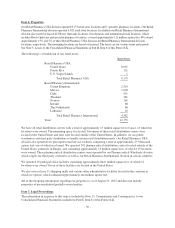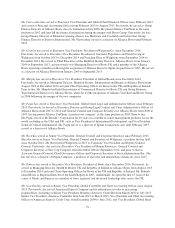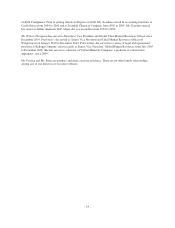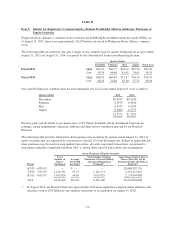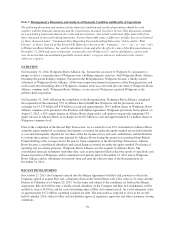Walgreens 2015 Annual Report Download - page 30
Download and view the complete annual report
Please find page 30 of the 2015 Walgreens annual report below. You can navigate through the pages in the report by either clicking on the pages listed below, or by using the keyword search tool below to find specific information within the annual report.or international trade laws, we may face sanctions including civil and criminal fines, disgorgement of profits, and
suspension or debarment of our ability to contract with governmental agencies or receive export licenses. In
addition, new initiatives may be proposed from time to time that impact the trading conditions in certain
countries or regions, and may include retaliatory duties or trade sanctions which, if enacted, could adversely
impact our trading relationships with vendors or other parties in such locations and have a material adverse effect
on our operations. From time to time, we may face audits or investigations by one or more domestic or foreign
governmental agencies relating to our international business activities, compliance with which could be costly
and time-consuming, and could divert our management and key personnel from our business operations. An
adverse outcome under any such investigation or audit could subject us to fines or other penalties, which could
materially and adversely affect our business operations, financial condition, and results of operations.
We could be subject to adverse changes in tax laws, regulations and interpretations or challenges to our
tax positions.
We are a large corporation with operations in the United States and numerous other jurisdictions around the
world. As such, we are subject to tax laws and regulations of the United States federal, state and local
governments as well as various foreign jurisdictions. We compute our income tax provision based on enacted tax
rates in the jurisdictions in which we operate. As the tax rates vary among jurisdictions, a change in earnings
attributable to the various jurisdictions in which we operate could result in an unfavorable change in our overall
tax provision. From time to time, legislative initiatives are proposed that could adversely affect our tax positions,
effective tax rate, tax payments or financial condition. In addition, tax laws are complex and subject to varying
interpretations. Any change in enacted tax laws, rules or regulatory or judicial interpretations, any adverse
outcome in connection with tax audits in any jurisdiction or any change in the pronouncements relating to
accounting for income taxes could adversely affect our effective tax rate, tax payments and results of operations.
Our insurance programs may expose us to unexpected costs.
We use a combination of insurance and self-insurance to provide for potential liability for workers’
compensation; automobile and general liability; property, director and officers’ liability; and employee
healthcare benefits. Provisions for losses related to self-insured risks generally are based upon actuarially
determined estimates. Any actuarial projection of losses is subject to a high degree of variability. Changes in
legal claims, trends and interpretations, variability in inflation rates, changes in the nature and method of claims
settlement, benefit level changes due to changes in applicable laws, insolvency of insurance carriers, and changes
in discount rates could all materially and adversely affect our financial condition and results of operations.
We could be adversely impacted by changes in assumptions used in calculating pension assets and
liabilities.
We operate certain defined benefit pension plans in the United Kingdom, which were closed to new entrants in
2010. The valuation of the pension plan’s assets and liabilities depends in part on assumptions, which are
primarily based on the financial markets as well as longevity and employee retention rates. This valuation is
particularly sensitive to material changes in the value of equity, bond and other investments held by the pension
plans, changes in the corporate bond yields which are used in the measurement of the liabilities, changes in
market expectations for long-term price inflation, and new evidence on projected longevity rates. Funding
requirements and the impact on the statement of earnings relating to these pension plans are also influenced by
these factors. Adverse changes in the assumptions used to calculate the value of pension assets and liabilities,
including lower than expected pension fund investment returns and/or increased life expectancy of plan
participants, or regulatory change could require us to increase the funding of its defined benefit pension plans or
incur higher expenses, which would adversely impact our results of operations and financial position.
-26-


